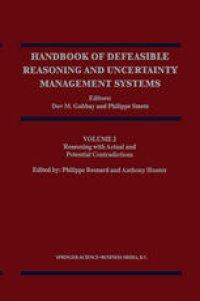
Ebook: Reasoning with Actual and Potential Contradictions
- Genre: Mathematics // Logic
- Tags: Logic, Artificial Intelligence (incl. Robotics), Mathematical Logic and Foundations
- Series: Handbook of Defeasible Reasoning and Uncertainty Management Systems 2
- Year: 1998
- Publisher: Springer Netherlands
- Edition: 1
- Language: English
- pdf
We are happy to present the second volume of the Handbook of Defeasible Reasoning and Uncertainty Management Systems. Uncertainty pervades the real world and must therefore be addressed by every system that attempts to represent reality. The representation of un certainty is a major concern of philosophers, logicians, artificial intelligence researchers and computer sciencists, psychologists, statisticians, economists and engineers. The present Handbook volumes provide frontline coverage of this area. This Handbook was produced in the style of previous handbook series like the Handbook of Philosophical Logic, the Handbook of Logic in Computer Science, the Handbook of Logic in Artificial Intelligence and Logic Programming, and can be seen as a companion to them in covering the wide applications of logic and reasoning. We hope it will answer the needs for adequate representations of uncertainty. This Handbook series grew out of the ESPRIT Basic Research Project DRUMS II, where the acronym is made out of the Handbook series title. This project was financially supported by the European Union and regroups 20 major European research teams working in the general domain of uncer tainty. As a fringe benefit of the DRUMS project, the research community was able to create this Handbook series, relying on the DRUMS partici pants as the core of the authors for the Handbook together with external international experts.
This volume deals with approaches to handling contradictory information. These include approaches for actual contradiction - both A and not-A can be proven from the information - and approaches for potential contradiction - where the information may contain arguments for A and arguments for not-A, but the system suppresses the contradiction by, for example, preferring some arguments over others. Approaches covered include paraconsistent logics, modal logics, default logics, conditional logics, defeasible logics and paraconsistent semantics for logic programming.
The volume is of interest to students, researchers and practitioners in artificial intelligence, software engineering, logic, language and philosophy. This volume is the first handbook to give a comprehensive coverage of handling contradictory information.
This volume deals with approaches to handling contradictory information. These include approaches for actual contradiction - both A and not-A can be proven from the information - and approaches for potential contradiction - where the information may contain arguments for A and arguments for not-A, but the system suppresses the contradiction by, for example, preferring some arguments over others. Approaches covered include paraconsistent logics, modal logics, default logics, conditional logics, defeasible logics and paraconsistent semantics for logic programming.
The volume is of interest to students, researchers and practitioners in artificial intelligence, software engineering, logic, language and philosophy. This volume is the first handbook to give a comprehensive coverage of handling contradictory information.
Content:
Front Matter....Pages i-vii
Introduction to Actual and Potential Contradictions....Pages 1-9
Paraconsistent Logics....Pages 11-36
Modal Logics for Representing Incoherent Knowledge....Pages 37-75
The Family of Default Logics....Pages 77-133
Conditional Logics for Defeasible Reasoning....Pages 135-173
Defeasible Logics....Pages 175-210
Necessary Conditions for Negation-Operators (with Particular Applications to Paraconsistent Negation)....Pages 211-239
A Survey of Paraconsistent Semantics for Logic Programs....Pages 241-320
Back Matter....Pages 321-333
This volume deals with approaches to handling contradictory information. These include approaches for actual contradiction - both A and not-A can be proven from the information - and approaches for potential contradiction - where the information may contain arguments for A and arguments for not-A, but the system suppresses the contradiction by, for example, preferring some arguments over others. Approaches covered include paraconsistent logics, modal logics, default logics, conditional logics, defeasible logics and paraconsistent semantics for logic programming.
The volume is of interest to students, researchers and practitioners in artificial intelligence, software engineering, logic, language and philosophy. This volume is the first handbook to give a comprehensive coverage of handling contradictory information.
Content:
Front Matter....Pages i-vii
Introduction to Actual and Potential Contradictions....Pages 1-9
Paraconsistent Logics....Pages 11-36
Modal Logics for Representing Incoherent Knowledge....Pages 37-75
The Family of Default Logics....Pages 77-133
Conditional Logics for Defeasible Reasoning....Pages 135-173
Defeasible Logics....Pages 175-210
Necessary Conditions for Negation-Operators (with Particular Applications to Paraconsistent Negation)....Pages 211-239
A Survey of Paraconsistent Semantics for Logic Programs....Pages 241-320
Back Matter....Pages 321-333
....